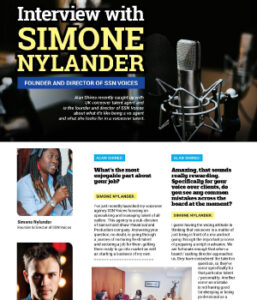 The Relationship Between an Artist and Their Agent
The Relationship Between an Artist and Their Agent
The relationship between an actor and their agent is a business one. Though a friendship may start and a relationship may deepen, the fundamental core of the working relationship is that of a business relationship. This misconception, particularly with newer actors and voiceover artists, is that a voice over agency will do all the work. The voiceover artist can not just sit at home all day waiting for the phone to ring. The agent will hustle work, but it is vital for the performer to ensure that:
- Headshots are up to date and reflect their casting bracket
- Demos and reels are up to date, reflecting their skill and range
- Availabilities are recorded appropriately for the agent to manage
Voiceover Workshops and Networking
In 2019 at an in-person event called Above and BeVOND, I had the joy of hanging out with Simone Nylander, the owner and founder of SSN Voices (though, at this point, she had not started the agency). I attended Simone’s workshop at this particular event, and I remember the attention to detail. Here is the thing: plenty of people out there can host and deliver workshops, so who do you go with? My angle is that I need to learn from the people who are dealing with the work; an actor booking the jobs I want, a casting director sending out the briefs for the roles I want, and the agents who are channeling those briefs are all great coach suggestions for me. Simone was exceptionally complimentary of my demo, which was reaffirming, and in her workshop, she gave me several good leads based on my style. From that, a friendship was born, and the article was born.
Actors, Voice Over Agency, and Interviews
There are so many fantastic resources and pieces of literature out there, and The Buzz Magazine is one I have had the joy of writing and interviewing for several times. In this instance, having an agent present in the magazine for voiceover artists to learn from was a great collaboration. As an artist, and in this instance also an interviewer, I internally asked myself, ‘what do I want to know?’ and ‘how can I add value to the audience here?’. I figured the information that would help me would help everyone. You can read the full article attached to this blog. However, the two talking points are trends and booking the job.
What Are the Trends in Voiceover?
The best trend example takes us to the commercial world as this gives the most noticeable change in the last decade. We remember the significant characters in the “BUY NOW! BUY NOW!” commercials. Some companies have a long-standing niche or something fresh to bring to the table and still adapt this style. But over the years, it has become a style used less and less. What replaced it was what is known as the ‘conversational read.’ The conversational read is supposed to be the ‘natural read.’ Its purpose is to give the element of honesty, relatability, and truthfulness. The best tip for nailing that read is to imagine who you are talking to and offer a feed-in line such as ‘hey, mom.’ Those elements just help set the tone, a natural tone.
Booking the Job!
It’s one of the heart-breaking elements of this industry. We see a brief that looks amazing, we get put forward and never hear anything again. No feedback, no audition, nothing. What can we do to ensure we at least get an audition? Well, make sure your experience is relevant to the applied role. Ensure your headshots are up to date and you look at the part for which you are auditioning. Make sure your demos and reels are up to date, and you demonstrate the skills needed for the desired job. Then finally, do not forget to constantly keep networking – it’s all about making friends, guys!
So, what happens when you get an audition? You may end up self-taping, making sure you are clear visually and audibly. Get a decent screen that you can crop and cut nicely. But more importantly, deliver a performance parallel with what the brief asks for. Make sure, more than anything else, that you are ‘acting.’ Make sure you give your best performance with a genuine delivery accurate to the brief.
So, what happens if you get called to an in-person audition? Well, much of the above remains to be true. Regardless of whether it is to a camera phone or a 10k + film set camera, you are still performing for a casting director to book the job. Be genuine, do what you must, and give your best performance.
Tips for Voiceover Talent
Make a mistake on the script? Do not go “URGH!” and start again. Instead, take a moment, and continue from where you left off. The same is valid with stutters and blips. However, make an error on your self-tape. Re-record it. Do not send something you do not think is terrific and totally finished. If you are auditioning in person or even online, you do not have the privilege of re-recording but in this instance, if you do, utilise it. Be friendly, and do not bring your bad hair day to the audition; no one likes a grump! Remember to stay in touch with the people you meet and audition for; next time, they might remember you or think you are a fit for something else.